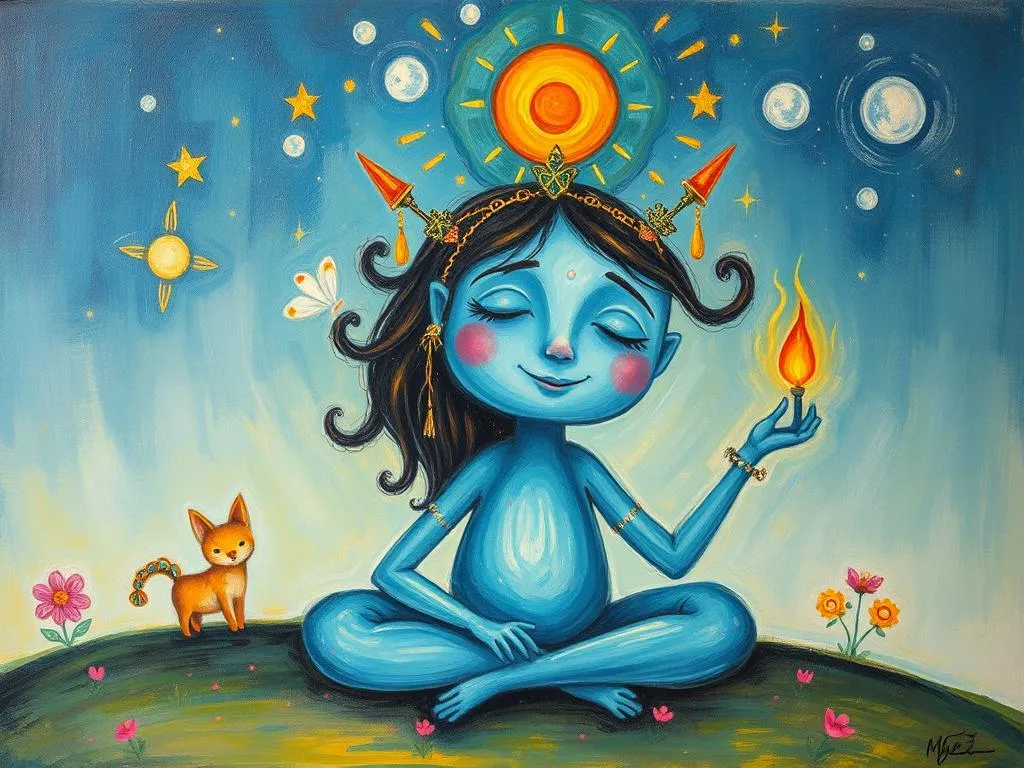
Introduction
Dreams have long been a fascinating subject for individuals seeking to understand the deeper layers of their unconscious mind. Among the myriad of symbols that can appear in dreams, the tilaka stands out for its rich cultural and spiritual significance, particularly in Hindu traditions. This small mark, often worn on the forehead, serves as a powerful symbol of identity, spirituality, and divine protection. The dream of tilaka can provoke curiosity and wonder, as it invites the dreamer to explore not only their personal beliefs but also their connections to cultural heritage. In this exploration, we will delve into the various meanings and interpretations of dreaming of tilaka, shedding light on how these dreams can resonate with our waking lives.
Symbolism and Meaning
In dreams, the tilaka is often a multifaceted symbol, representing a blend of personal, spiritual, and cultural elements. At its core, the tilaka signifies spiritual awakening and divine favor. When you dream of tilaka, it may be a reflection of your desire for spiritual growth or a sign that you are being guided by higher forces. The act of wearing a tilaka in a dream can indicate that you are in tune with your spiritual self or that you seek to deepen your connection with the divine.
Moreover, the tilaka serves as a cultural marker that can signify one’s identity and social standing. In many Hindu communities, it is customary to wear tilaka as a form of respect and devotion. Dreaming of this symbol may suggest a need to reconnect with your roots or to explore the cultural aspects of your life that you may have overlooked. It can be a call to honor your heritage or to integrate its teachings into your daily existence.
From a psychological perspective, the tilaka can symbolize protection and guidance. The mark is often associated with the third eye, a concept linked to intuition and inner vision. In this context, dreaming of tilaka might indicate that you are being encouraged to trust your inner voice and intuition. It may suggest that you are on the right path and that spiritual forces are at play, guiding you through challenges or decisions in your life.
Additionally, the specific color and design of the tilaka in your dream may carry its own significance. For instance, a red tilaka may symbolize passion and energy, while a white or yellow tilaka could denote purity and clarity. The nuances of these symbols can deepen the interpretation of your dream, inviting you to reflect on the emotions and situations you associate with these colors.
Key Scenarios and Variations
The context in which the tilaka appears in your dream can significantly influence its interpretation. For example, dreaming of applying tilaka to your forehead might symbolize a moment of self-affirmation or acceptance of your spiritual journey. This act can be seen as a declaration of your identity and your commitment to your beliefs. It may also suggest that you are preparing yourself for a new chapter in life, one where you embrace your spirituality more fully.
Conversely, if you dream of seeing someone else wearing tilaka, it may represent your admiration for their spiritual or cultural authenticity. This dream could indicate a desire to learn from their experiences or to integrate some of their qualities into your life. It may also point to a longing for guidance from a mentor or a spiritual figure who embodies the ideals you aspire to.
Another scenario to consider is dreaming of a tilaka that is smudged or faded. This could reflect feelings of doubt or disconnection from your spiritual path. It may serve as a reminder to evaluate your current beliefs and practices, urging you to seek clarity and renewal. This dream might be a call to cleanse your spirit or to engage in practices that restore your sense of purpose and direction.
In some dreams, a tilaka may appear in a ceremonial context, such as during a wedding or a religious festival. This scenario often signifies celebration and community. It can be interpreted as a reminder of the importance of connection with others who share your beliefs and values. Such dreams highlight the power of collective spirituality and the joy of participating in cultural rituals.
Lastly, if you dream of having difficulty applying the tilaka or finding it missing altogether, this might symbolize feelings of insecurity or a fear of losing your spiritual identity. It could be a prompt to explore what aspects of your life might be causing you to feel disconnected from your beliefs or traditions. This dream invites you to confront any obstacles that may be hindering your spiritual journey and encourages you to seek ways to reconnect with your inner self.
Real-Life Connections and Takeaways
Understanding the significance of dreaming about tilaka can offer valuable insights for navigating real-life situations. One of the primary takeaways from these dreams is the importance of self-reflection. After experiencing a tilaka dream, consider what aspects of your spiritual or cultural identity you may be neglecting. Reflect on whether you are honoring your heritage and values in your daily life. This could be an opportune moment to engage with your community or to explore cultural practices that resonate with you.
Additionally, these dreams can serve as a reminder to cultivate your intuitive abilities. If the tilaka appears as a protective symbol, it may be time to pay attention to your instincts and intuition in making decisions. Trusting your gut feelings can lead to greater clarity and confidence in your choices. This may involve setting aside time for meditation or mindfulness practices that allow you to connect with your inner voice.
Another practical piece of advice is to explore ways to integrate spirituality into your everyday routine. Whether through prayer, meditation, or simply taking time to appreciate nature, finding small moments to reconnect with your spirituality can have profound effects on your overall well-being. This can help you cultivate a sense of inner peace and purpose, reinforcing the protective and guiding qualities associated with the tilaka.
Moreover, consider the relationships in your life and how they might reflect the themes of your dream. If your dream involved admiration for someone else’s tilaka, think about the role of mentors or spiritual guides in your life. Are there individuals whose wisdom you value? Reaching out to them for support or guidance can provide you with fresh perspectives and encouragement on your spiritual journey.
Lastly, if your dream involved a smudged or faded tilaka, take this as an opportunity to identify areas of your life where you may feel disconnected or uncertain. Engage in conversations with trusted friends or spiritual leaders to gain insights and clarity about your beliefs. This can be a powerful way to restore your sense of identity and purpose, allowing you to move forward with confidence.
Conclusion
Dreaming of tilaka is a rich and multifaceted experience that invites exploration into the depths of our identity, spirituality, and cultural connections. By examining the symbolism and variations of this dream, we gain valuable insights into our waking lives and the emotions that shape our experiences. The act of reflecting on these dreams can lead to profound self-discovery and personal growth. As you navigate the complexities of your journey, remember that the tilaka serves as a reminder of your spiritual essence and the divine guidance that is always within reach. Embrace these dreams as opportunities for reflection, connection, and clarity, and allow them to illuminate your path forward.







